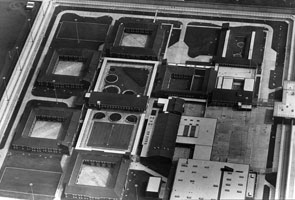19 July 2007 Edition
Women prisoners routinely ill-treated in North

Maghaberry prison
By Laura FrielWomen prisoners in the Six Counties are routinely isolated, ignored, abused and mistreated, according to a report by the Human Rights Commission. The failure to provide adequate, female-centred places of detention leaves women prisoners particularly vulnerable. Incarceration in male dominated institutions results in women enduring restricted facilities and inadequate care while at the same time being subjected to open hostility and the constant threat of sexual violence.
The vast majority of women prisoners are convicted of minor offences, mostly debt related and pose no serious threat, yet the prison regimes to which they are subjected fail to reflect the distinctive pattern and nature of female offending. “We are calling once again for a separate and self-contained facility for women prisoners,” said Monica McWilliams, chief commissioner of the Human Rights Commission.
The commission argues that prison is often a totally inappropriate punishment and should only be used as a last resort. Over 40% of women prisoners are jailed for non-payment of fines, says McWilliams. The report points out that women who pose no threat spend two thirds of their time locked in their cells.
Often women who fall foul of the criminal justice system are already vulnerable with many suffering from mental health problems or problems of addiction to either legal or illegal drugs and alcohol. A significant number will have also experienced domestic violence, physical and sexual abuse. “We highlight the demand for appropriate mental health facilities to be made available in the community,” says McWilliams.
The current practice of detaining girls under the age of eighteen in prison is described as a serious breach of international human rights standards and should be ended. The report makes 55 recommendations and the Commission says it will be monitoring the authorities’ response.
The Prison Within is a second report by the Commission and follows an earlier study into the treatment of women prisoners, The Hurt Inside published two years ago. The first report emerged after a series of suicides amongst female inmates incarcerated in Maghaberry focused attention on the negative consequences of jailing women prisoners within a high security male prison.
The report called for the establishment of a completely separate, purpose built, female detention centre. The response of the authorities was to move women out of Maghaberry into another male prison, Hydebank, a young offenders unit on the outskirts of Belfast.
In its follow-up report the Commission found many of the problems underpinning the incarceration of women prisoners in Maghaberry were not addressed by relocation in Hydebank. In other words the system is still failing women prisoners and some of the key recommendations made in the earlier report have not been implemented.
Accounts by women prisoners of the many problems they face offer the most compelling portrait of what can only be described as degrading and inhumane treatment meted out by both the prison authorities and male prisoners incarcerated in the same institution. Different aspects of systematic neglect and abuse are graphically described by those interviewed.
Neglect includes long periods of isolation locked in cells, inadequate access to basic educational and recreational material and facilities, lack of medical, particularly mental health care and the brutal treatment of women involved in self harm or at risk of suicide.
Although the prison is low security and has extensive grounds, access is restricted because of the threat of male violence and the women can only walk around when accompanied by staff. Use of the gym and education facilities is also restricted with the priority given to male inmates. According to the report women prisoners spent most of their time sitting in silence on hard chairs and smoking.
Women deemed at risk were kept on corridors that also contain punishment cells for aggressive male inmates who often subjected women prisoners to sexually threatening verbal abuse. Consequently women suffering from depression or at risk of self-harm and suicide were made to share not only the same location as violent male prisoners but also the same ethos of punishment.
Abuse sometimes flows from the implementation of inappropriate procedures such as strip-searching or placing women at risk in isolation units. At other times it flows from the failure of the authorities to implement procedures to stop informal abuse by male prisoners.
Both collude in establishing an ethos of degrading and inhumane treatment in which women suffer dual mechanisms of discrimination, either because their specific needs as women are ignored or because the abuse they encounter is gender specific.



